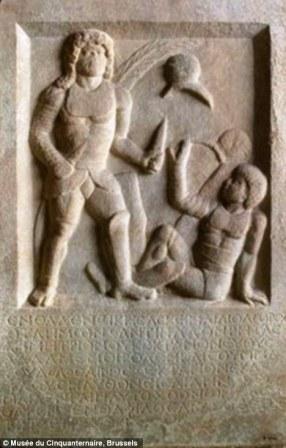 This interesting article is in The Daily Mail. Very cool stuff about gladiators and tombstones.
This interesting article is in The Daily Mail. Very cool stuff about gladiators and tombstones.
Roman gladiator’s gravestone blames poor refereeing for losing a key battle (and his life)
Scientist finally decodes epitaph on tombstone
By Daily Mail Reporter
His tomb was unearthed about 100 years ago, but the meaning of the inscription on his gravestone has remained a mystery – until now.
Scientist Michael Carter, of Brock University in Canada, has studied hundreds of inscriptions on gladiator gravestones.
He has now decoded that of Diodorus and claims it is unique in that it actually tells the story of his death.
Written from the gladiator’s own perspective, it reads: ‘After breaking my opponent Demetrius, I did not kill him immediately. Fate and the cunning treachery of the summa rudis killed me.’
The ‘summa rudis’ refers to a veteran gladiator who would have refereed the fight during which Diodorus lost his life.
Therefore, when the slain warrior’s friends and family composed the inscription for his gravestone, they were clearly in no doubt as to where the blame lay.
The epitaph also includes an engraving that Dr Carter believes explains the circumstances leading up to his death.
Diodorus can be seen standing over his fallen opponent, called Demetrius, while holding two swords.
Dr Carter suggests this means Diodorus had managed to get hold of Demetrius’s sword while he was on the ground.
But the summa rudis ruled that Demetrius had fallen over by accident, meaning he would have been allowed to get up and resume fighting.
‘Demetrius signals surrender, but Diodorus doesn’t kill him,’ Dr Carter said. ‘He backs off expecting that he’s going to win the fight.
‘What the summa rudis has obviously done is stepped in, stopped the fight, allowed Demetrius to get back up again, take back his shield, take back his sword, and then resume the fight.’
It was then that the fatal blow was struck and Diodorus was killed, a turn of events that clearly appalled the gladiator’s loved ones.
The epitaph was donated to the Musée du Cinquanternaire in Brussels shortly before the First World War.
Dr Carter’s study is published in the Journal for Papyrology and Ancient Epigraphics.
Console yourself concerning your fallen comrades with some…


































I didn’t even know they had referees in gladiatorial contests.
It was a very regulated sport. They even had scores and rankings. Nothing like the free-for-all depicted in popular culture.
Gladiatorial purists maintain that such mistakes are a part of the game and continue to oppose instant replay.
Is it just me, or is this posting a Shakespeare-like double-meaning and commentary on current events?
What an interesting tidbit. The more things change the more things stay the same.
I thought the gladiator would have used the tombstone to announce a major change, namely: his retirement from gladiatorhood.
Mundabor
I used to hear it said that it was the men who have refereed fights, battles with uniforms and shiny buttons and applause and epic stories to tell about it, and men who invented “good sportsmanship”. This is because their fights were not only fights, but proving grounds. When women fought, it was because fighting was necessary, winning truly vital, and there was no one else to do it. They did not care if it was pretty or ugly. The only thing that mattered was winning, or else they wouldn’t be fighting. No sportsmanship, no rules. In those days, there was some truth to that.
Obviously, that was before Title IX. I think it may still sometimes apply today to fights between Christians or other people who live under the ideal that they live without conflict. When fighting isn’t allowed, when there is no admiration for skill, finesse, or technical excellence in conflict, when the pretense is that only the nature of the other’s offense brought on the fight at all, the fights that do break out can get very very ugly.
“Here lies a courageous fight-ah.
Ended his life in a real nail bight-ah.
For that blindus rudis biased the defenda
We all know: ‘He coulda been a contenda’ “
He had “loved ones”… huh… suppose that makes sense.
Not nearly as bad as the blown call in the 9th inning of Game 6 of the 1985 World Series!
http://mlb.mlb.com/video/play.jsp?content_id=13062921
@isnowhere: Not all gladiators were slaves or captive soldiers. Once it really got going, many free Roman citizens voluntarily opted to sign on with a school and fight for a set period of time (2-3 years or so? I forget offhand). It gained them huge money (and bonuses), as well as fame and glamour. These folks often had families and loved ones.
Also, as more gladiators were freemen and/or gained some semblance of pay (or at least bonuses or other incentives for fighting bravely), they eventually began to organize among themselves a school insurance fund of sorts. It was usually something that would at least pay for their headstone and funeral, with maybe a little left over for their families if they had any.
It could just as well be that the “loved ones” Fr. mentions could be fellow fighters from the same school, since they often had a pretty good sense of camaraderie (in spite of sometimes facing each other).
@Random Walk…
Thank you… I understood what Father meant, and was aware that not all were slaves… just never really opened my mind to think much past that. The term “loved ones” caught me when I read it. It made sense.